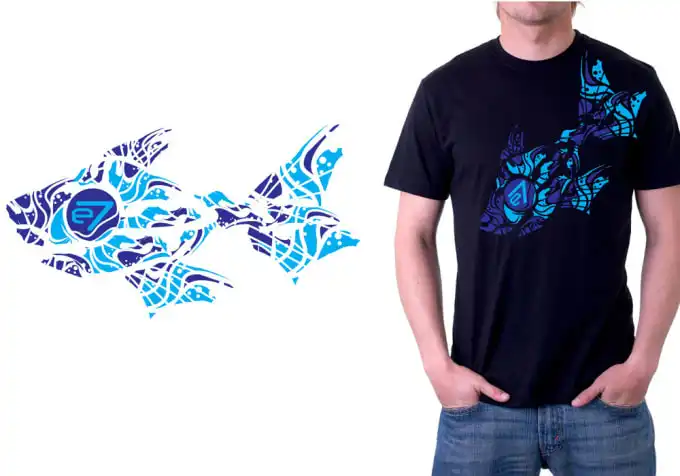Custom t-shirt printing has evolved significantly over the years, offering a wide range of design possibilities through various printing techniques. At the heart of these techniques is the ink used, which plays a critical role in achieving the desired look, durability, and feel of the final product. Different inks are chosen based on the printing method, fabric type, and design requirements. Understanding the types of inks used in custom t-shirt printing helps businesses and individuals choose the right option for their needs.
In this article, we’ll explore the most common types of inks used in custom t-shirt printing, their characteristics, and when they are best applied.
Plastisol Ink
Plastisol ink is one of the most widely used inks in custom t-shirt printing, especially for screen printing. It is a PVC-based ink that doesn’t dry until it’s cured using heat, making it versatile and easy to work with. Plastisol is known for its vibrant colors and durability, which makes it a popular choice for producing bold and long-lasting designs.
Advantages
- Vibrant Colors: Plastisol inks produce bright and bold colors, making them ideal for designs that require strong visibility and sharp details.
- Durability: This ink adheres well to fabric and lasts through multiple washes without fading or cracking.
- Versatility: It works on a wide variety of fabrics, including cotton, polyester, and blends, making it suitable for most custom t-shirts.
Disadvantages
- Thicker Feel: Plastisol ink can feel heavy on the fabric, especially if the design involves multiple layers or large areas of coverage.
- Environmental Impact: Since it’s PVC-based, plastisol ink is not the most eco-friendly option, and its production may involve the use of harmful chemicals.
Water-Based Ink
Water-based inks are known for their soft feel and eco-friendliness, making them a preferred choice for environmentally conscious printing. Unlike plastisol, these inks soak into the fabric rather than sitting on top of it, resulting in a softer texture and a more natural appearance.
Advantages
- Soft Finish: Water-based inks are absorbed into the fabric, leaving a soft and breathable finish that feels light on the skin.
- Eco-Friendly: They are non-toxic, contain fewer chemicals, and are water-soluble, making them more environmentally friendly compared to plastisol inks.
- Good for Light Fabrics: Water-based inks work best on light-colored fabrics, producing smooth and vibrant designs.
Disadvantages
- Limited Use on Dark Fabrics: Water-based inks do not show up as well on dark fabrics unless special additives or discharge methods are used.
- Less Durability: They may fade faster than plastisol inks, especially if not cured properly, though advancements in water-based inks have improved their longevity.
Discharge Ink
Discharge ink is a water-based ink that works by removing (or “discharging”) the existing dye from a garment and replacing it with the ink color. It is primarily used for printing on dark-colored fabrics and is popular for achieving soft, vintage-style prints.
Advantages
- Soft Feel: Like standard water-based inks, discharge inks offer a soft feel because they penetrate the fabric rather than sit on top of it.
- Great for Dark Fabrics: Discharge ink allows for bright and vivid prints on dark fabrics without the need for an underbase, making it an excellent choice for dark-colored t-shirts.
- Vintage Look: It creates a slightly faded, worn-in look, which can be desirable for certain design aesthetics.
Disadvantages
- Complicated Process: The discharge process is more complex and requires precise curing to ensure that the dye removal and replacement are successful.
- Not Suitable for All Fabrics: Discharge ink works best on 100% cotton fabrics. It may not produce the same effect on polyester or other fabric blends.
Sublimation Ink
Sublimation ink is used in a printing technique where the ink is turned into gas and then infused into the fabric fibers using heat. This method works best on polyester fabrics or garments with a high polyester content.
Advantages
- Permanent Designs: Sublimation inks create designs that are infused into the fabric, meaning the print won’t fade, crack, or peel over time.
- Soft and Breathable: Since the ink becomes part of the fabric itself, there is no extra layer of ink sitting on top of the garment, making it soft to the touch.
- Full-Color Designs: Sublimation allows for high-quality, full-color designs, making it ideal for photo prints or complex graphics.
Disadvantages
- Limited Fabric Use: Sublimation ink works best on light-colored polyester fabrics and cannot be used effectively on cotton or dark-colored fabrics.
- Expensive: The sublimation process can be more expensive and requires specialized equipment, making it less accessible for smaller-scale projects.
Eco-Friendly and Hybrid Inks
As the demand for more sustainable and environmentally friendly options grows, hybrid inks and eco-friendly alternatives are becoming more popular in the custom t-shirt printing industry. These inks aim to combine the benefits of traditional inks with a lower environmental impact.
Advantages
- Eco-Conscious: Many eco-friendly inks are made with fewer harmful chemicals and aim to reduce environmental damage during production and application.
- Improved Performance: Hybrid inks offer a balance between durability and environmental sustainability, offering vibrant colors without compromising the planet.
Disadvantages
- Availability: These inks may not be as widely available or cost-effective as traditional options, depending on the supplier.
Conclusion
Choosing the right ink for custom t-shirt printing depends on the fabric type, the design’s complexity, and the desired outcome in terms of durability and texture. Plastisol, water-based, discharge, sublimation, and eco-friendly inks all offer unique advantages, and understanding these options can help you make an informed decision when creating custom apparel. Whether you prioritize durability, softness, or sustainability, there’s an ink solution to match your needs.







